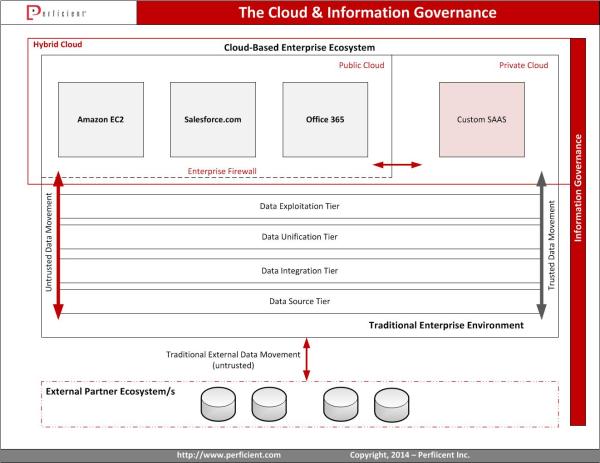The practice of Information Governance (IG) is evolving rapidly; it has become much more than just Data Governance. One of the most interesting and challenging additions to IG recently has been management of Cloud-related issues. The Cloud of 2014 is much different than how it was conceived just a few years ago (with strict and somewhat arbitrary definitions for IAAS, PAAS and SAAS). The Cloud has evolved into the ‘Multi-Cloud’ – commonly referred to as “Hybrid Cloud;” the typical enterprise is now harnessing several different types of Cloud solutions from a diverse set of vendors. And of course, these Clouds represent capability and data provided from a growing set of geographically dispersed data centers.
With this emerging landscape, many assumptions regarding IG ownership, security and lifecycle control have been effectively “rebooted.” In this post, we’ll take a look at some of the new assumptions, common issues and information Governance tasks associated with complex Cloud-driven enterprises.
Cloud IG Assumptions:
- Most enterprises going forward will have 1 or more Cloud related solutions they need to manage (these include both customer facing and back-office capabilities).
- Management of Cloud solutions will often involve partnerships (between Cloud providers and client enterprises)
- Critical enterprise data will likely be spread beyond the traditional enterprise firewalls and datacenters; some of it will be solution-specific (owned) and some of it will be entirely client-owned and managed.
- Operational governance will include various metrics and oversight similar to traditional managed services approaches – however this will be spread across more providers requiring “SLA integration” in order to ensure holistic enterprise service level management.
- Expansion of enterprise data across Cloud realms will force a higher level of security diligence in organizations that previously hadn’t attempted adoption of comprehensive security controls.
The Future of Big Data
With some guidance, you can craft a data platform that is right for your organization’s needs and gets the most return from your data capital.
Common Cloud IG Issues / Challenges:
- Metadata Reconciliation – Metadata coordination is vital to providing effective enterprise search capabilities as well as for supporting advanced analytics. In complex Hybrid Cloud enterprises, metadata is fractured even further and there may be multiple levels of analytics in play.
- Master Data Management – MDM in the Cloud was a recent topic of a Perficient Webinar; the reason this has become important is that core back-office capabilities are now moving to the Cloud, but perhaps not all of them. This means that vital business entities are now spread across multiple domains making MDM centralization more difficult (but not impossible).
- Data Security – This is actually a huge topic and often one of the first ones that come up when discussing any external Cloud adoption. And, there isn’t one answer on how to handle it.
Cloud IG – Getting Started:
So, how does an enterprise adapt to this rapidly changing landscape? There are a few excellent starting points to begin tackling IG in the Cloud, they include:
- Creating an “Information Asset Map” (we will present an example of one of these in a future post), that illustrates the distribution of assets across environments with descriptions of data classification, integrations, points etc.
- Creating an Enterprise-wide Information Governance plan or updating it is if it already exists to document strategy and processes for coordinated IG across environments.
- Definition of cross-domain security controls and integration of those within a unified managed services framework.
This is a complex topic and we will be dedicating a number of upcoming posts to explain some of what we’ve introduced here in today in greater depth.
copyright 2014 – Perficient Inc.

